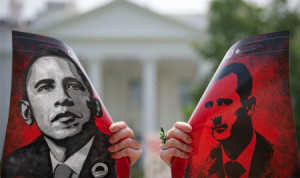The postponement of the U.S. military intervention in Syria, or, as it seems, the White House’s decision to cancel military operations against Damascus, has become a turning point in global politics of recent months. For the first time in the 10 years since the U.S. invasion of Iraq, Washington and its NATO allies’ determination to start another war in the name of Western “democratic ideals” has stalled in the face of resistance from a united front consisting of a number of countries, led by Russia and China, which are no longer willing to put up with shameless Western dictates.
Until today, international relations simply boiled down to the White House’s “black and white” battle of “good” (the West and its satellites, including the conservative regimes of the Persian Gulf) against “evil” (Russia, China, the East, the Islamic world, but without the Wahhabite regimes), which Western leaders at the behest of the United States regularly fed public opinion with after the first Gulf war. And new global powers, the economies of which are quickly and dynamically growing on the world stage and which are not associated with the West, began aggressively and confidently opposing this concept with a more traditional and logical vision of geopolitics, which relies on their strategic interests and such key concepts as an ally/enemy, balance, threat to national interests, interference in internal affairs, violation of sovereignty, etc.
Be that as it may, during the aggression against Iraq and Libya, not to mention Afghanistan and Mali, the protests of developing countries were not able to do anything about the warlike spirit of the West. The regular threats to use the veto powers and its repeated application in the Security Council by Russia and China could at best only delay the plans for “civilized” wars of NATO and its satellites. But then why has there been such a hasty retreat by the United States and France on the issue of Syria? Distrust in the public opinion of both countries, of course, has played a role, but the decisive factor that made Barack Obama reverse his position, of course, turned out to be Russia’s tough diplomatic position, anchored by a unified anti-war front from key emerging powers (from Brazil to India and Africa).
The question arises as to why, this time round, the United States for the first time gave in to pressure from Russia and countries of the “Third World”? It appears that the U.S. administration has realized that profound objective changes have taken place in today’s world and that the era of the hegemony of the world’s sole super power in the form of the United States has come to an end. In this new, multipolar and globalized world, Washington must take into account partners who do not always count themselves among its allies, and in some cases even silently accept defeat.
“The all-powerful America” of the late 20th century is just an outdated illusion today. And the same applies to Europe, united as the European Union. Now a quarter of the U.S. national debt is in the hands of China and much of its production capacity has been transferred to developing countries. As a result, the United States has very little leverage over states with which it is in an interdependent relationship. However, unlike the European powers such as France and Great Britain, which still regard themselves as “global players” in world affairs, Washington has powerful armed forces, which, however, are not enough to impose American “order” on the world. In addition, President Obama’s retreat on Syria suggests that mere military superiority is insufficient to counter the rapidly developing countries of the “Third World”, which are gradually becoming aware of their power. And if we compare the West’s growth rates with those of these parts of the world, there is no doubt that in the coming years, this trend will only gain momentum.
The decline of some powers (ie. the United States and Europe) and the strengthening of other powers oriented towards non-intervention (this is, first of all, China, Russia, Brazil, India, Indonesia and other developing countries) plays into the hands of those who find themselves in the sights of Western countries and thus strengthens their bargaining position with the United States and its allies.
Moreover, even before the outbreak of civil war in Syria, the Americans and the Europeans with their own actions made real heroes out of Mugabe, Chavez and Ahmadinejad in the “struggle against imperialism”. What is even more indicative for the United States and Europe is the example of Syria – when the Western-Wahhabi axis announces the start of military intervention, and then immediately reverses itself at the face of the public’s opposition to the war. This has undermined the position established in recent years, which nullified regimes’ legitimacy and set the stage for endless civil wars and internal conflicts, such as Iraq, Afghanistan, Libya, Egypt, etc.
It remains to be seen what the outcome of the Syrian conflict will be. If the regime in Damascus holds out, it will be a milestone in the new balance of power in the world divided between East-West and North-South axes. The United States and the West in general will have to resort to a policy of isolationism, avoiding interference in global conflicts in order to not suffer new set backs.
So Syria will now largely decide the future scheme of the new world order in which the West is no longer the dominant force, where it will no longer solve its problems with violations of international law and without regard to the views of new global players with their growing political, military and economic weight.
Vladimir Simonov is an expert on the Middle East, and Candidate of Historical Sciences. Exclusively for the online magazine New Eastern Outlook.

